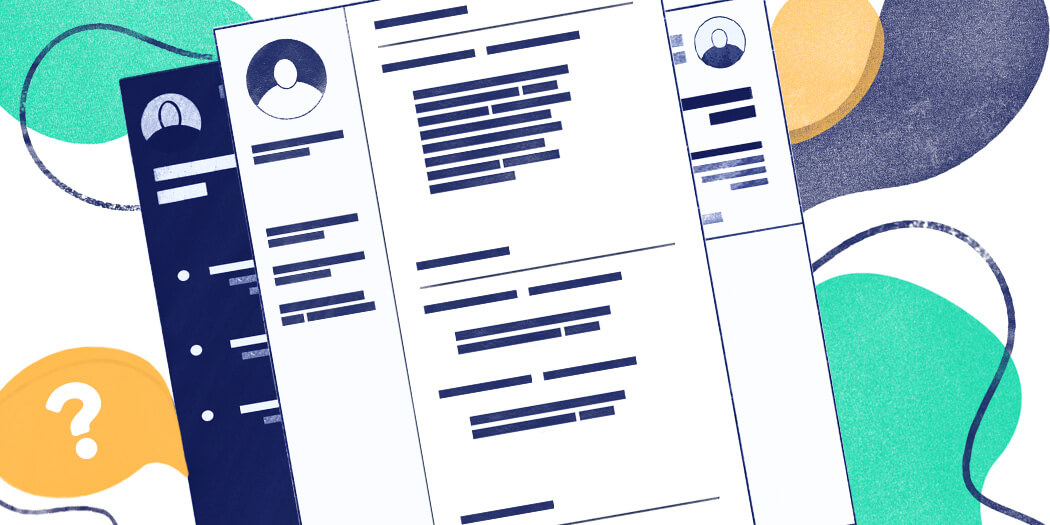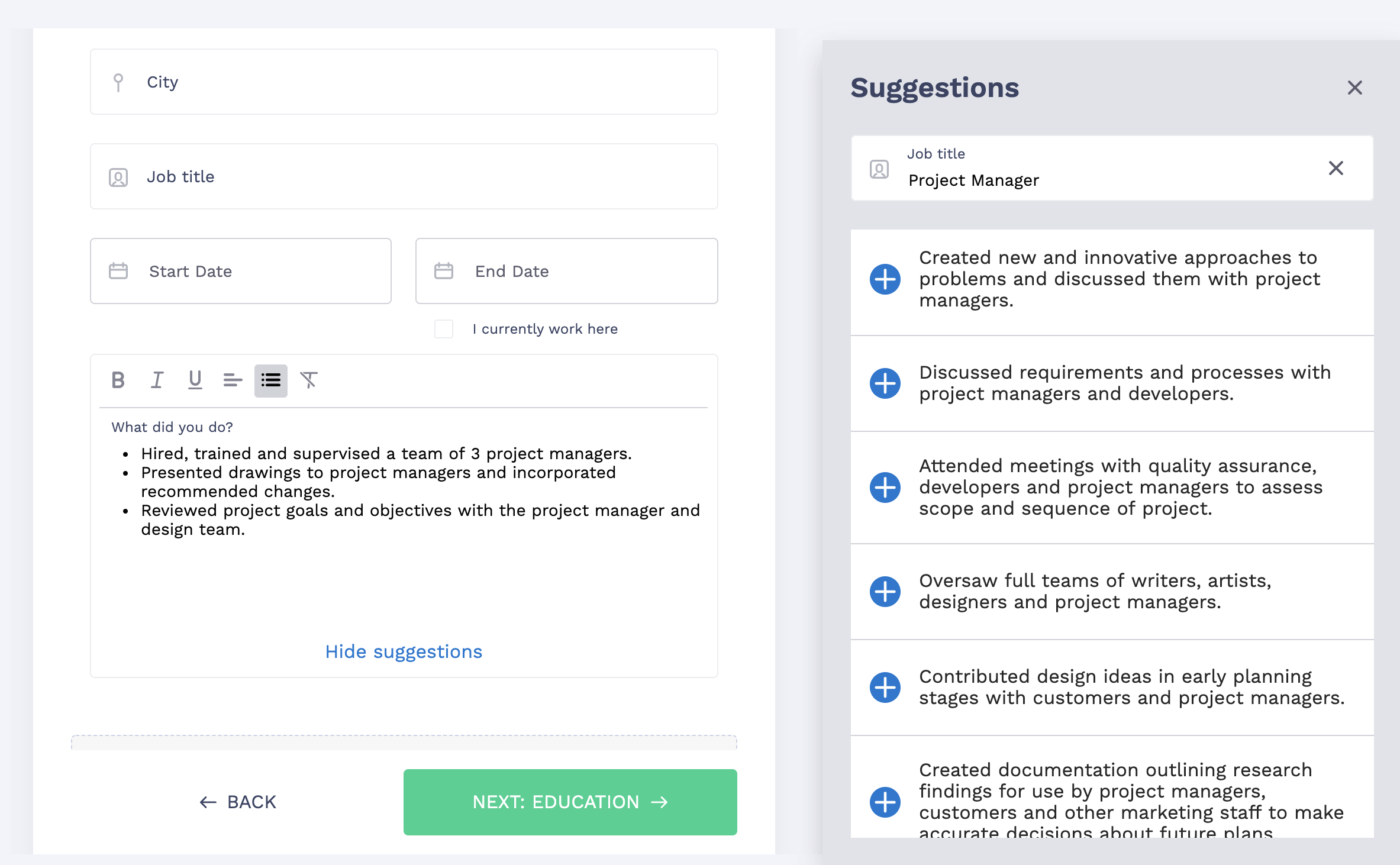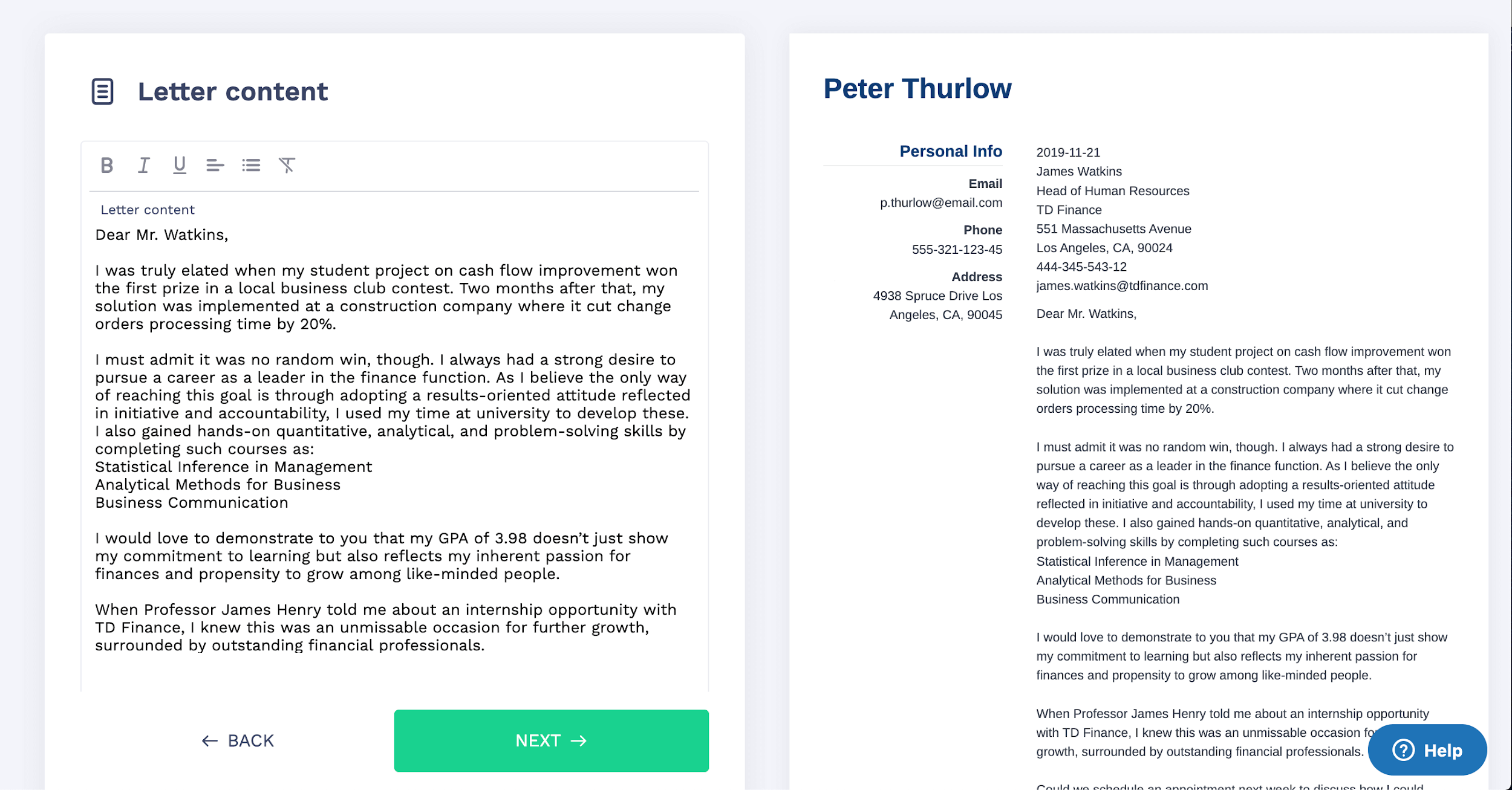
Find the Best Resume Format for You in 2026
To help you choose the best resume format, let’s first understand the differences between the three main resume formats. See the examples and make an informed choice.

Mariusz Wawrzyniak
Career Expert
The use of resume keywords is what gives you an advantage over other candidates. Recruiters are pressed for time. They don’t even read resumes; they scan them in search of important terms. Worse than that—
They’re even too busy to do the scanning themselves and use automated tools, called applicant tracking systems. So, if you want your resume to be read, learn how to use keywords for a resume.
This guide will show you:
Save hours of work and get a job-winning resume like this. Try our resume builder with 20+ resume templates and create your resume now.

What users say about ResumeLab:
I had an interview yesterday and the first thing they said on the phone was: “Wow! I love your resume.”
Patrick
I love the variety of templates. Good job guys, keep up the good work!
Dylan
My previous resume was really weak and I used to spend hours adjusting it in Word. Now, I can introduce any changes within minutes. Absolutely wonderful!
George
Resume keywords are specific words and phrases that describe your professional skills and relevant experience and expertise. They indicate the qualities hiring managers look for in candidates. Resume keywords also help your job application rank higher in search results when employers use ATS software.
To identify the right keywords for your resume, carefully review the job description and tailor your application accordingly. If you possess those skills and experience, you need to show it off in a way that is easy to understand by humans and robots alike.
So, you need to use resume keywords, and use them right. Why?
Your resume isn’t read, it’s scanned. First, by automated software (ATS) which assists companies and human resources with the hiring process. ATS scans all candidates’ resumes and assigns a score based on each candidate’s compatibility to the position. Once an employer adds the ~250 resumes they get for each job posting into the ATS, they can filter the candidates based on resume keywords they’re looking for.
For example: Of those 250 resumes, 50 have Skill A, 75 have Skill B, but only 5 have both A and B.
Those last 5 will receive a call for an interview. According to ERE, the ATS will filter out about 75% of all job applications per job ad.
Second, by the actual recruiter. Most recruiters spend merely seconds (or minutes at best) looking at resume just to make sure the candidate meets their requirements. If you don’t have the right experience and skills (or don’t know how to present them!), you’re done. You’ll never hear back.
So, how to make sure you pass the test? Finding the right words in the job ad and using them as your resume keywords is a must. The next section will teach you how to do it.
Expert Hint: To see how your resume stacks up on the ATS, use a resume keyword finder like Jobscan and use an ATS-friendly resume template to make it past the bots.
Prepare your targeted resume with the job ad in front of you and use its language as your resume keywords.
Let’s look at this resume sample job description snippet for an operations associate:
Qualifications:
Experience with MS Office
Bachelor's Degree preferred
Experience using Hubspot, Xsellco or other CRM software
Experience using back-end for Amazon, Walmart, eBay or other similar online marketplaces
Experience in a similar position preferred or experience managing a small team
To be qualified for this position, the candidate needs to have and mention their experience with CRM software and the largest online marketplaces. That’s in addition to expertise in managing a small team.
Have this experience but fail to include it? It’s like you never had any experience at all—they’ll toss your resume. Use wording that matches the job description so you have the best chance of appeasing the ATS scan. To succeed in this particular example, on your resume you’d have to include the knowledge of “MS Office,” instead of separating it into “Word,” “Excel,” etc.
However, don’t copy everything! They want a resume from a well-qualified candidate, not a plagiarized version of their original job ad—32% of employers auto-reject applications that copy too much text from the ad. That above example lists some easy-to-follow nouns to add here and there in your resume.
But now, let’s look at another sample text for a project coordinator:
Position Summary: The Project Coordinator will provide integral support to the office through implementation of all logistics as they pertain to Early Childhood project meetings, professional development support, communications, and other office-related work. Will provide ongoing resource management to ensure all program resources are efficiently utilized and maintained. Will ensure project transparency with timely and effective project communication, escalating issues and risks as appropriate. Performs related work.
Paragraphs like these are harder to parse, but they’re just as rich in resume keywords as any list of responsibilities or qualifications. For keywords such as “timely and effective project communication,” use that phrase in your resume profile (objective, summary, or summary of qualifications).
Alternatively, talk about this in your job experience section from a past position.
Expert Hint: Keywords should never be repeated in a resume? Untrue. You can highlight your expertise in a given skill or task by using it more than once as a keyword on your resume. This increases the keyword density and will help you to match better. But only do this on the most crucial keywords!
Sometimes the job listing won’t give you all the powerful keywords for resumes. In these cases, you just have to find them on your own.
But it’s easy. Here are the best places to find power words to use as your resume keywords and industry buzzwords:
You can search for resume keywords based on the position (e.g., administrative assistant keywords), industry (e.g., marketing resume keywords), and seniority (e.g., management resume keywords).
List of keywords to use in a resume for finance:
List of resume keywords related to management:
List of keywords to use on a resume for human resources:
List of keywords to use on a resume for legal:
List of keywords to use on a resume for IT:
Finally, don’t underestimate the importance of action words for resumes.They can elevate your resume to the next level. Use words like "negotiated," "managed," "analyzed," "achieved," or "exceeded" to make your resume stand out.
The ResumeLab builder is more than looks. Get specific content to boost your chances of getting the job. Add job descriptions, bullet points, and skills. Easy. Improve your resume in our resume builder now.

Nail it all with a splash of color, choose a clean font, and highlight your skills in just a few clicks. You're the perfect candidate, and we'll prove it. Use our resume builder now.
Expert Hint: When writing you resume, avoid negative words, passive voice, “I” words, cliched statements, and the “references available upon request” phrase. They all will hurt your chances of landing a job interview.
Let’s start with an example job ad:
TripSuggest is seeking a competent travel booking agent with at least two years’ experience. Expert knowledge of Sabre CRS is required. Ideal candidate will have strong interpersonal skills and communication skills. Familiarity with Microsoft Office a plus.
Most keywords you’ll take from a job listing like this will fit into your resume skills section. The list of skills for a resume is a great place to add both soft skills they’re looking for (e.g., interpersonal skills, communication skills) and hard skills (e.g., Microsoft Office, Sabre CRS).
However, if it is more crucial to the position, give it a boost by speaking of these also in other areas, such as your resume summary or work experience.
Here’s a sample resume summary:
Competent travel booking agent with 3+ years experience with both Amadeus and Sabre CRS…
See that? We brought your CRS expertise out of the depths of the skills section to the heading statement—which is sure to get more eye time. On top of that, we satisfied the experience length requirements, and we used their wording mentioning the specific position being applied for.
And, as far as technical and computer skills (e.g. Sabre CRS) are concerned, you can also bring it up in a separate certifications section:
Certifications & Awards
- 2018 Sabre Personal Trainer certificate from The Travel Institute — 98% score
Finally, soft skills, such as leadership or problem-solving, are more vague, so you can additionally hint at them in your hobbies and interests section.
For example, an opening for a supervisor can get a subtle nod at your leadership skills by mentioning how you like to coach the junior softball team in your spare time. There are many ways to add strong words to use on a resume!
Expert Hint: How many resume keywords should you use? 25 to 30 is a good number, all parts of a resume included. Make it a healthy mix of words from the job ad and words you come up with yourself (with the help of Wikipedia, Google, etc.).
The resume is not the only document you’re writing or handing in. You’ll likely send it in an email and accompany it with a matching cover letter. Therefore, to additionally boost your chances of winning that job interview invitation, you have to reuse your resume keywords in your email to the recruiter and in your cover letter.
The cover letter is often read prior to the hiring manager getting around to your resume. On top of that, they could choose to use the ATS to parse your cover letter for keywords, as well. Do it especially with those resume keywords you feel are most important to determining your fate.
You can also use your cover letter to reword and explain particular keywords from your resume.
Also, try to “speak the company’s language” on your cover letter by using their tone and energy. You can get the gist of it on the company’s website. Also, check out our best cover letter tips to tweak your letter of application even more, and our article on how to write a cover letter for a step-by-step guide.
Finally, make sure to include one email keyword that appears on many job ads:
If you’re interested in the job, please use the phrase “Sales Position 34SK-T Application” as your email subject line.
Use the required phrase as your email subject. Don’t rephrase it. If you do, your application may never reach the recruiter.
Expert Hint: One keyword you might have overlooked—the company name. Adding the company name to your cover letter and email (and even your resume objective statement) shows you took the time to customize your application just for them.
Never lie on your resume. That being said, what happens if you are on the fence about including a particular keyword? Let’s look at this job ad example for an accountant:
Qualifications and Skills:
Bachelor’s degree in Accounting or related field
Your situation? You are finishing up your last semester at college. Here’s what you can do in your resume’s education section for the said accountant's resume:
Majoring in Accounting
Hunter College, New York, NY
Expected Graduation: 2019
This gets those important keywords (“bachelor’s degree” and “accounting”) onto your resume without lying about it, and helps you to pass the ATS test. Then, when the hiring manager does the human check, they can make their own decision.
Double your impact with a matching resume and cover letter combo. Use our cover letter generator and make your application documents pop out.

Want to try a different look? There's 21 more. A single click will give your document a total makeover. Pick a cover letter template here.
Expert Hint: When adding keywords on a resume, copy their naming conventions. If they use “BA,” you use “BA.” If they say “bachelor’s degree,” you say “bachelor’s degree.” This will get you covered for the exact keywords they’ll enter into the ATS.
Here’s a recap of all the important things you have to know about resume keywords:
Have any questions on how to use keywords on resume? Not sure how to describe your skills using powerful words and action verbs? Get at us below in the comments, and thanks for reading!
At ResumeLab, quality is at the crux of our values, supporting our commitment to delivering top-notch career resources. The editorial team of career experts carefully reviews every article in accordance with editorial guidelines, ensuring the high quality and reliability of our content. We actively conduct original research, shedding light on the job market's intricacies and earning recognition from numerous influential news outlets. Our dedication to delivering expert career advice attracts millions of readers to our blog each year.

To help you choose the best resume format, let’s first understand the differences between the three main resume formats. See the examples and make an informed choice.

Mariusz Wawrzyniak
Career Expert

Military resume examples and tips. Write a civilian resume with military experience. Make your military-to-civilian resume fast, with good and bad examples.

Tom Gerencer
Career Expert

Though most candidates prefer a reverse-chronological resume format, a combination resume is no worse. If your skill list goes further than a few lines, this guide is for you.

Marta Bongilaj, CPRW
Certified Professional Resume Writer, Career Expert